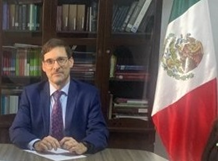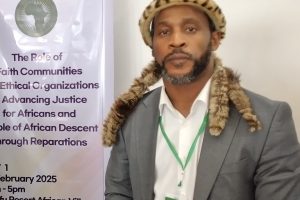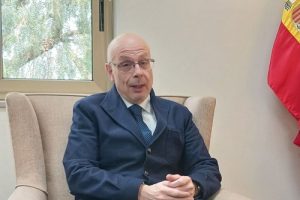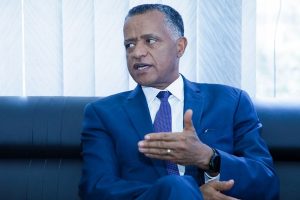
Ethiopia and Mexico enjoy a decades old strong diplomatic relations. While sharing many areas of interest that call for cooperation between the two countries, the seal of the strong ties was Mexican firm stance at the League of Nations against the fascist invasion and aggression over Ethiopia in the 1930’s.
In recognition of the strong stance taken to safeguard Ethiopia’s sovereignty, Ethiopia has named one of the largest round about in its capital after Mexico. Now lying at the epicenter of the metropolis Mexico is a very common and the most repeatedly called word among the residents of Addis, as every one has to cross the place to and from home every day.
Despite the geographical distance between them the two countries are doing their best to establish strong diplomatic and people to people ties.
Alejandro Ives Estivill Castro is Ambassador of Mexico to Ethiopia and Permanent Observer to AU. He is both a diplomat and novelist. He specializes in Mexican literature of the 20th Century. He holds a BA in Hispanic Literature from the National Autonomous University of Mexico (UNAM) and a PhD. in Literature from El Colegio de México.
After his entrance into the Foreign Service in 1993, he has served as special advisor to the Secretary of Foreign Relations, Political Affairs Attaché for the Mexican Embassy in Costa Rica, Chief of Staff for the Undersecretary of Foreign Relations Enrique Berruga, Director General for Cultural Affairs and Director General for North American Affairs. He held the position of Chargé d´Affairs at the Embassy of Mexico in the UK and Deputy Chief of Mission at Embassy of Mexico in the United States. He was appointed General Consul of Mexico in Montreal, Canada, 2016.
During the celebration of the annual Spanish Language Day here at the United Nations Economic Commission for Africa (UNECA) over the week, Ambassador Estivil was one of the speakers as representative of the country with the largest number of Spanish language speakers in the world.
The Ethiopian Herald approached him for a brief conversation about the bilateral relations between Mexico and Ethiopia as well as Africa. Here is an exceprt:
Could you tell me just the current state of bilateral relations in Ethiopia between Ethiopia and Mexico?
We have a great Moment Like an excellent moment. Historically there’s a lot to say because Mexico was the first country to demand legal action by the League of Nations at that time 1935 against the fascist invasion of Ethiopia. That was something that provoked a lot of Knowledge from the European Society. Emperor Haile Selassie I of Ethiopia travelled to Mexico in 1954 was a great visit. You know, at that moment Emperor Hailesellasie was a figure very well renowned in the world then for Mexico, we started many activities of cooperation here. We had our Embassy since many years ago. We had to close in the late 90s, but we reopened very fast. And since then we have been one of the first six observers of the African Union. So today we have very good programs. The main ones are in diaspora management. That’s something that Ethiopia is recognizing the expertise of Mexico. So we share a lot of information because both countries have a lot of its population in another country mostly in the United States.
We also have South-South cooperation in the case of growing wheat and Cactus and some corn and also we can share a lot of a lot of cooperation. So we have a political relationship and great image and Ethiopians believe that the image of Mexico in the world is very very good of course Ethiopians in Mexico are also very very well accepted because we have this magnet that a country that was never conquered that represents the pride of the African not only Ethiopia but also the African Pride all around the world is something very recognizable.
Ethiopia is undergoing a national dialogue and peace-building process. In what way can Mexico support?
Well, we have been the champions for the entrance of the African Union to the G20. We believe that this is a matter of giving the population options for better development. Once you have that, it starts a virtual cycle in which all that violence can be erased. So we are helping in that financial in that good trend of development that has to be very well understood at the same time. South-South Cooperation is the name of the game today and we are facing a lack of good resources for cooperation with the big Powers. So we have the developing countries to talk among us and try to give options to our countries. More than that is this possibility, as I was saying today in
the day of the Spanish Language, that we have to put together the Integrity that one language (in this case is Spanish) or other than that, it was at the same time to respect the peculiarities that are the main content of each country and Ethiopia. There are a lot of popularities, a lot of regions and a lot of ethnic groups that had to live together and develop this united way of being Ethiopians. So we have the opportunity to share experiences on both sides and we are doing that.
The other very important issue between countries is trade and export. So in that sector how are Mexico and Ethiopia doing as they have very long and strong relations?
Mexico has good experience in what free trade means because we were the ones to the very advantageous decision to go to a free trade agreement with the biggest power economic power in the world, the United States. So we have developed in this more than 25 years almost 30 years of free trade among in our region a lot of expertise and that is not only to leave everything to the market is to make it intelligently with and socially oriented. So we believe that free trade in Africa is going to be a great future for the youth population. We have to talk about doing those things very important to give opportunities for Innovation and creativity to the young population so that they represent what they should represent which is the growth and the great opportunities that Africa has in the world.
If not, that would mean violence, social problems, etc. So free trade is, and we have experience that we can share with Ethiopians and with other African countries. But also with this socially oriented content, sometimes a country has to reserve a small part of the free trade. So we have to do it intelligently, and that’s what we are going to develop in the next years in the African continent.
We have free trade in America and more than 27 other countries. We are one of the most open countries in the world and believe in free trade. This social orientation is not only to leave things to the market; it is to do it intelligently and we have experience there, and we are talking with African countries.
How do you see the bilateral trade ties between Ethiopia and Mexico at this moment?
Small but this is starting to grow a little bit more. We have very a lot of the raw materials that come from mining here in Ethiopia and some Machinery that is developed in Mexico. We have to ship that not only that to our craft elements things that talk about culture and services are going to be also very relevant Mexico has good experience in fintech.
We are seeing all this new development banks that are here in the private banks that are developing and they are producing apps and things like that. We have an experience there. And of course, the cultural Industries in which Ethiopia has so much to offer imagine to diffuse more about the dancing the music. Ethiopia has such good jazz, and good music, that puts together the traditional elements with modern ones. So that’s the kind of industrial control industries that we have to Foster.
Ethiopian Airlines connects many African countries with the outside world. Is it also connecting Mexico with Ethiopia and Africa?
I am very glad that Ethiopian is already travelling to the new Mexican airport IA the airport that with cargo they are travelling there and we are going to try to grow that so if we can have this process of a good carrier that helps us to bring things from 1 side to the other. We are going to see an important growth in the bilateral trade.
Thank you very much!
Thank you!
BY ZEKARIAS WOLDEMARIAM
THE ETHIOPIAN HERALD SATURDAY 18 MAY 2024





